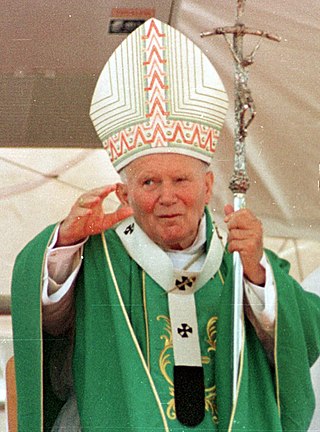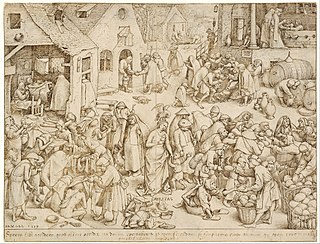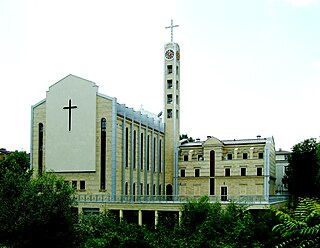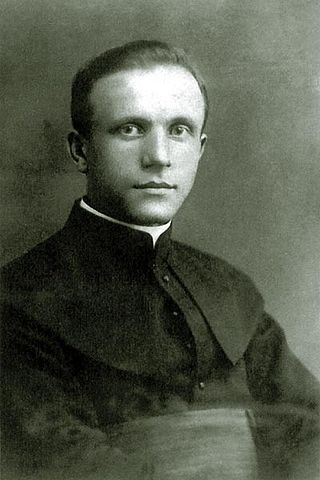
Pope John Paul II was head of the Catholic Church and sovereign of the Vatican City State from 1978 until his death in 2005.
A jubilee is a special year of remission of sins, debts and universal pardon. In Leviticus, a jubilee year is mentioned to occur every 50th year; during which slaves and prisoners would be freed, debts would be forgiven and the mercies of God would be particularly manifest.

Mercy is benevolence, forgiveness, and kindness in a variety of ethical, religious, social, and legal contexts.

In Catholicism, the Divine Mercy is a devotion to Jesus Christ associated with the reported apparitions of Jesus to Faustina Kowalska.

Divine Mercy Sunday is a feast day that is observed in the Roman Rite calendar, as well as some Anglo-Catholics of the Church of England. It is celebrated on the Second Sunday of Easter, which concludes the Octave of Easter. It is originally based on the Catholic devotion to the Divine Mercy that Faustina Kowalska reported as part of her encounter with Jesus, and is associated with special promises from Jesus and indulgences issued by the Catholic Church.

The teachings of Pope John Paul II are contained in a number of documents. It has been said that these teachings will have a long-lasting influence on the Church.

The image of the Divine Mercy is a depiction of Jesus Christ that is based on the Divine Mercy devotion initiated by Faustina Kowalska.

The Chaplet of the Divine Mercy, also called the Divine Mercy Chaplet, is a Catholic devotion to the Divine Mercy, based on the Christological apparitions of Jesus reported by Faustina Kowalska (1905–1938), known as "the Apostle of Mercy". She was a Polish religious sister of the Congregation of the Sisters of Our Lady of Mercy and canonized as a Catholic saint in 2000.

Works of mercy are practices considered meritorious in Christian ethics.

The Cathedral of St Joseph is a Latin Catholic cathedral in Sofia, the capital of Bulgaria. It is the co-cathedral of the Latin Diocese of Sofia and Plovdiv, together with the Cathedral of St Louis in Plovdiv.

Dives in misericordia is the name of the second encyclical written by Pope John Paul II. It is a modern examination of the role of mercy—both God's mercy, and also the need for human mercy—introducing the biblical parable of the Prodigal Son as a central theme. The original text was written in longhand in Polish. The encyclical was promulgated on 30 November 1980.
Dominum et vivificantem is the fifth encyclical written by Pope John Paul II. The encyclical was promulgated on 18 May 1986. It is a theological examination of the role of the Holy Spirit as it pertains to the modern world and the church and the use of spiritual prayer to renew one's spiritual life. This extended meditation on the Holy Spirit completed the Pope's Trinitarian trilogy of encyclicals, which includes Redemptor Hominis and Dives in Misericordia.

Maria Faustyna Kowalska, OLM, also known as Maria Faustyna Kowalska of the Blessed Sacrament, was a Polish Catholic religious sister and mystic. Faustyna, popularly spelled "Faustina", had apparitions of Jesus Christ which inspired the Catholic devotion to the Divine Mercy, therefore she is sometimes called the "secretary" of Divine Mercy.

The Divine Mercy Sanctuary in Kraków, Poland, is a Roman Catholic basilica dedicated to the devotion of the Divine Mercy, and is the resting place of Saint Faustina Kowalska.

Michael Sopoćko was a Polish Roman Catholic priest and professor at Vilnius University. He is best known as the spiritual director of Faustina Kowalska. He was beatified by Pope Benedict XVI in 2008.

Holy Rosary Church is a Roman Catholic church located within the Archdiocese of Baltimore in Baltimore, Maryland. It was established to serve Baltimore's Polish community.

World Youth Day 2016 was the 15th World Youth Day, an international event organised by the Catholic Church and focused on faith and youth that took place from 26 to 31 July 2016 in Kraków, Poland. It was the third World Youth Day held in Central Europe.

The Extraordinary Jubilee of Mercy was a Catholic period of prayer held from 8 December 2015, the Solemnity of the Immaculate Conception, to 20 November 2016, the Feast of Christ the King. Like previous jubilees, it was seen by the Church as a period for remission of sins and universal pardon focusing particularly on God's forgiveness and mercy. It was an extraordinary Jubilee because it had not been predetermined long before; ordinary jubilees are usually celebrated every 25 years.

Misericordiae vultus is a papal bull of indiction issued on April 11, 2015, by Pope Francis, proclaiming an Extraordinary Jubilee of Mercy from 8 December 2015, the Feast of the Immaculate Conception, to 20 November 2016, the Feast of Christ the King.

Liberating a Continent: John Paul II and the Fall of Communism is a David Naglieri documentary about the role Pope John Paul II played in the demise of the U.S.S.R., the end of Communism in Poland, and lifting the Iron Curtain. It is narrated by Jim Caviezel, his fourth narration of a documentary regarding the Catholic faith and the second of which is about John Paul II. It is directed by David Naglieri, who has also directed John Paul II in Ireland a Plea for Peace and John Paul II in America: Uniting a Continent. The former was the first documentary Caviezel narrates that deals with John Paul II. It portrays the 9 day visit to Poland the Pope made in 1979, where he influenced the Solidarność movement. It also documents John Paul II's role in the movement to end martial law as declared by leaders of Poland, positing that his meetings with Communist leaders of Poland changed the course of history.














